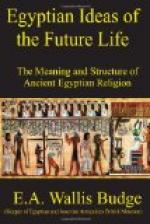Here we notice at once that the deceased is identified with Osiris, the god and judge of the dead, and that they have bestowed upon him the god’s own name; the reason of this is as follows. The friends of the deceased performed for him all the ceremonies and rites which were performed for Osiris by Isis and Nephthys, and it was assumed that, as a result, the same things which took place in favour of Osiris would also happen on behalf of the deceased, and that in fact, the deceased would become the counterpart of Osiris. Everywhere in the texts of the Book of the Dead the deceased is identified with Osiris, from B.C. 3400 to the Roman period. Another point to notice is the application of the words ma[=a] kheru to the deceased, a term which I have, for want of a better word, rendered “triumphant.” These words actually mean “true of voice” or “right of word,” and indicate that the person to whom they are applied has acquired the power of using his voice in such a way that when the invisible beings are addressed by him they will render unto him all the service which he has obtained the right to demand. It is well known that in ancient times magicians and sorcerers were wont to address spirits or demons in a peculiar tone of voice, and that all magical formulae were recited in a similar manner; the use of the wrong sound or tone of voice would result in the most disastrous consequences to the speaker, and perhaps in death. The deceased had to make his way through a number of regions in the underworld, and to pass through many series of halls, the doors of which were guarded by beings who were prepared, unless properly addressed, to be hostile to the new-comer; he also had need to take passage in a boat, and to obtain the help of the gods and of the powers of the various localities wherein he wanted to travel if he wished to pass safely into the place where he would be. The Book of the Dead provided him with all the texts and formulae which he would have to recite to secure this result, but unless the words contained in them were pronounced in a proper manner, and said in a proper tone of voice, they would have no effect upon the powers of the underworld. The term ma[=a] kheru is applied but very rarely to the living, but commonly to the dead, and indeed the dead needed most the power which these words indicated. In the case of Ani, the gods, having accepted the favourable report of the result obtained by weighing Ani’s heart by Thoth, style him ma[=a] kheru, which is equivalent to conferring upon him power to overcome all opposition, of every kind, which he may meet. Henceforth every door will open at his command, every god will hasten to obey immediately Ani has uttered his name, and those whose duty it is to provide celestial food for the beatified will do so for him when once the order has been given. Before passing on to other matters it is interesting to note that the term ma[=a] kheru is not applied to Ani by himself in the Judgment Scene, nor by Thoth, the scribe of the gods, nor by Horus when he introduces him to Osiris; it is only the gods who can make a man ma[=a] kheru, and thereby he also escapes from the Devourer.




